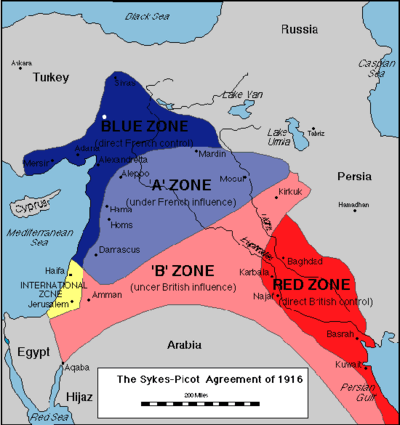This morning’s key headlines from GenerationalDynamics.com
- Arab countries seek to overturn the century old Sykes-Picot agreement
- Syria: A victim of colonial politics
- Palestine: Sykes-Picot and Balfour Declaration left a ‘savage legacy’
- Lebanon: Survived Sykes-Picot largely intact
Arab countries seek to overturn the century old Sykes-Picot agreement

The 1916 Sykes-Picot agreement split the Mideast between Britain and France (Jewish Virtual Library)
Few American have heard of the Sykes-Picot agreement of May 1916, although today it is a matter of widespread interest in the Arab world, and is considered to be a piece of Western treachery that has caused untold misery in the Arab world for the last century.
This year is the 100th anniversary of the Sykes-Picot agreement, named after Frenchman Francois Georges-Picot and Briton Mark Sykes. The secret agreement was reached on May 9, 1916, and signed a week later by Britain, France and Tsarist Russia on May 15, 1916. The purpose of the agreement was to split up the remains of the Arab countries after the defeat of the Ottoman Empire, which had ruled them for centuries.
During the British fight against the Turkish Ottomans, the British had obtained the help of Arab armies by promising that after the war there would be a truly independent Syrian state that included Palestine, Transjordan, and Lebanon. However, that promise was made in the knowledge that it would be betrayed, because the secret Sykes-Picot agreement described how the region would be split between France and Britain as their respective colonies. The betrayal was exposed when the secret agreement was revealed, and that occurred after the Bolshevik Revolution in Russia, when Leon Trotsky published the details of the deal in November 1917.
The next betrayal was the Balfour Declaration by the British in 1917, promising the establishment of a Jewish state in Palestine.
The borders set by Sykes-Picot/Balfour have remained largely intact, with few exceptions. There was the independence of Sudan from Egypt, and then the secession of South Sudan. North and South Yemen were unified, as were the United Arab Emirates (UAE). There were also changes to the Palestinian territories and Palestine, related to the establishment of Israel.
But there are many Arabs, especially Palestinians, who blame Sykes-Picot/Balfour as the source of all their misery. The so-called Islamic State (IS or ISIS or ISIL or Daesh) has specifically said that Sykes-Picot is dead, but other nationalist Arab groups are calling for its abolition, mostly for local political reasons. The Kurds have been leading the calls for an end to Sykes-Picot, and the creation of a Kurdistan state.
In the past two decades, and especially since the “Arab Spring” of 2011, the Arab world has been disintegrating, with wars in Syria, Libya, Iraq and Yemen. Many Arabs blame todays troubles on the Sykes-Picot agreement that was signed a century ago.
From the point of view of Generational Dynamics, to suggest that the Arab world has disintegrated in the war because of an agreement signed in 1917 is nonsense. The Mideast has been in an almost constant state of war for centuries, and no Western agreement could have either caused or prevented further wars. As I have been writing for years, the entire Mideast is headed for massive sectarian and ethnic wars, and those wars are coming about because of powerful generational forces that no politicians can control.
The Gulf News has done a series of articles on the effects of the Sykes-Picot agreement on different Mideast countries, and those articles are summarized in the sections below. Globe and Mail (Canada) and Sputnik News (Moscow) and Deutsche Welle
Syria: A victim of colonial politics
As the Ottomans were leaving Syria in 1920, the French forces landed on Syria’s coast and started marching toward Damascus, with the specific objective of taking control of France’s share of the Sykes-Picot agreement. The French crushed the Syrian army, imposed martial rule, and divided Syria into border-free mini-states. Syria’s borders with the British Mandate Palestine, the newly-created State of Greater Lebanon, and the newly created emirate of Transjordan were all set by the French.
Syria declared a republic in 1932, and became independent in 1946, when it was a co-founder of both the Arab League and the United Nations.
Egyptian President Jamal Abdul Nasser merged Syria and Egypt in 1958 to form the United Arab Republic (UAR). It lasted only 43 months, and crashed in September 1961. The UAR was an attempt to reshape the borders defined by Sykes-Picot, however it failed and the original borders are still standing. Gulf News (Dubai) and Gulf News
Palestine: Sykes-Picot and Balfour Declaration left a ‘savage legacy’
As the Ottoman armies retried, the British, with the help of their Arab allies, conquered Palestine and all of Greater Syria. The British administered Palestine directly until they received a mandate from the League of Nations that ran from 1923 to 1948. At the same time, the British favored the Zionist agenda of creating a protectorate and a government based on “some kind of Council to be established by the Jews.”
This was formulated in 1917 by the Balfour Declaration, issued by British Foreign Secretary Arthur Balfour that, “His Majesty’s government view with favor the establishment in Palestine of a national home for the Jewish people, and will use their best endeavors to facilitate the achievement of this object.” This is considered by the Arabs to be a double-cross, a betrayal of well-documented British promises to seek an Arab government of the territories liberated from the Ottomans.
In the decades that followed, Jewish colonies and Zionist aspirations advanced steadily, culminated in the 1948 Naqba (“Catastrophe”), the creation of the State of Israel, and the bloody crisis war that evicted more than 700,000 Palestinians from their homes. For Arabs, and especially Palestinians, this is the savage legacy of the Sykes-Picot agreement and the Balfour Declaration, causing enormous suffering and misery to the present day. Gulf News (Dubai) and Gulf News
Lebanon: Survived Sykes-Picot largely intact
Lebanon has existed for thousands of years, home of Christians, Muslims, Druze, Maronites, and others. Lebanon came out pretty well in the 1919 Paris Versailles Peace Conference. One reason was sympathy for Lebanon because during the war, an Ottoman embargo lead to a famine in which 200,000 died in Mount Lebanon alone. So Lebanon survived intact, and elected a president in 1926. The French mandate was terminated with independence in 1943. Gulf News (Dubai)
KEYS: Generational Dynamics, Sykes-Picot Agreement, Francois Georges-Picot, Mark Sykes, Turkey, Ottoman Empire, Balfour Declaration, Palestine, Russia, Leon Trotsky, Bolshevik Revolution, Transjordan, Islamic State / of Iraq and Syria/Sham/the Levant, IS, ISIS, ISIL, Daesh, Egypt, Jamal Abdul Nasser, United Arab Republic, UAR, League of Nations, Naqba, Israel, Christians, Muslims, Druze, Maronites
Permanent web link to this article
Receive daily World View columns by e-mail

COMMENTS
Please let us know if you're having issues with commenting.